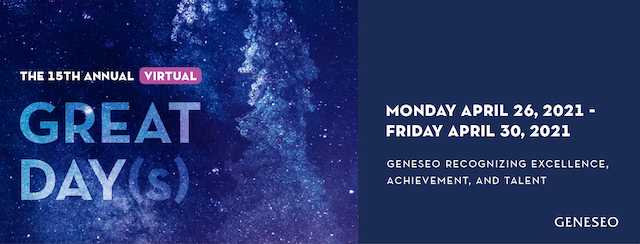
Submission Type
Poster
Start Date
April 2021
Abstract
The COVID-19 pandemic created an unprecedented demand on society and individuals. In Spring 2020, SUNY-Geneseo students were sent home with an anticipated potential delay in their return, as the COVID-19 situation was still developing. All instruction was provided remotely for the remainder of the semester. It was clear at the outset that the impact of online instruction on students would be differential. We adjusted our originally planned research to study the impact of the pandemic on Asian-American students. Thirty Asian-American and Asian students enrolled at SUNY-Geneseo were recruited for an interview study. Nine students consented to participate. We subjected the interview transcripts to an a priori content analysis with categories that emerged from the literature review. Results showed that the perceived advantages of living on campus were independence and autonomy among students. The perceived disadvantages include a low variety of cuisines, lack of emotional support, feelings of isolation, limited transportation, homesickness, and worry about family. Perceived advantages of living at home were the availability of appealing foods, emotional support, and developing stronger bonds with families. The perceived disadvantages of living at home were increased stress and distractions, extra household responsibilities, familial conflicts, lack of personal space, lagging internet access, and lack of access to academic resources. The study also finds that some participants were hesitant to express their distress. The participants did not experience discrimination/harassment first-hand. However, they expressed intense worry for their parents related to potential COVID-19 and rising discrimination against Asians. We recommend that culturally relevant psychological and educational resources be made available for students.
Keywords: Coping strategies, adjustment to online instruction, family relationship
Recommended Citation
Biswa, Sharmila and Sherpa, Tshering, "286— Qualitative Study of the Experience of Asian-American Students During the Pandemic" (2021). GREAT Day Posters. 49.
https://knightscholar.geneseo.edu/great-day-symposium/great-day-2021/posters-2021/49
286— Qualitative Study of the Experience of Asian-American Students During the Pandemic
The COVID-19 pandemic created an unprecedented demand on society and individuals. In Spring 2020, SUNY-Geneseo students were sent home with an anticipated potential delay in their return, as the COVID-19 situation was still developing. All instruction was provided remotely for the remainder of the semester. It was clear at the outset that the impact of online instruction on students would be differential. We adjusted our originally planned research to study the impact of the pandemic on Asian-American students. Thirty Asian-American and Asian students enrolled at SUNY-Geneseo were recruited for an interview study. Nine students consented to participate. We subjected the interview transcripts to an a priori content analysis with categories that emerged from the literature review. Results showed that the perceived advantages of living on campus were independence and autonomy among students. The perceived disadvantages include a low variety of cuisines, lack of emotional support, feelings of isolation, limited transportation, homesickness, and worry about family. Perceived advantages of living at home were the availability of appealing foods, emotional support, and developing stronger bonds with families. The perceived disadvantages of living at home were increased stress and distractions, extra household responsibilities, familial conflicts, lack of personal space, lagging internet access, and lack of access to academic resources. The study also finds that some participants were hesitant to express their distress. The participants did not experience discrimination/harassment first-hand. However, they expressed intense worry for their parents related to potential COVID-19 and rising discrimination against Asians. We recommend that culturally relevant psychological and educational resources be made available for students.
Keywords: Coping strategies, adjustment to online instruction, family relationship


Comments
Sponsored by Anjoo Sikka